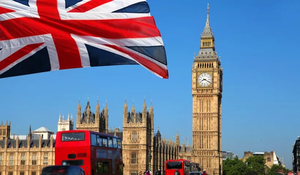America
Biden Praises UK’s New PM Keir Starmer in First Talks

July 11 :
President Joe Biden praised Britain as a crucial ally on global challenges, particularly the situation in Ukraine, during his first meeting with Prime Minister Keir Starmer at the White House on July 10. As they shook hands in the Oval Office, the 81-year-old Biden reminded his fellow center-left leader that they are the best of allies in the world.
As an additional point, Biden referred to Britain as the "knot tying the transatlantic alliance together." Less than seven days after becoming elected, Starmer, 61, made his official debut at a NATO conference in Washington. He emphasized the significance of "this special relationship is so important" and stated that it is "stronger than ever now."
Both guys made light of England's 2024 European Championship semi-final triumph over the Netherlands, joking that it was "all because of the prime minister."
The elephant in the room, though, is that none of them dealt with the fact that Joe Biden's reelection prospects have been in shambles ever since his terrible debate performance against Donald Trump.
Allies are worried that Trump, who has publicly questioned NATO's relevance and entertained thoughts of striking a quick deal with Russia over Ukraine, will be re-elected in the next term due to the increasing speculation about Biden's health.
While in Washington, Starmer authorized missile attacks inside Russia and pledged to maintain Britain's unwavering support for Kyiv.
Starmer stated that he had a "very good" discussion with Ukrainian President Volodymyr Zelensky on the margins of NATO's 75th anniversary summit, only days after his Labor Party swept elections and ousted the Conservatives in power for fourteen years.
In an interview with reporters, Starmer emphasized that the UK's support will remain unchanged regardless of the government in power.
Starmer gave Kyiv the go-ahead to launch strikes inside Russia when he announced on his way to Washington that the Storm Shadow missiles given by the UK were for "defensive purposes," but that their deployment was up to Ukraine.
According to Starmer's planned July 11 speech to NATO leaders, Britain would remain in solidarity with Ukraine "for as long as it takes."
British officials also announced that he will renew funding for Ukraine's military assistance at £3 billion ($3.9 billion) each annum until 2030–31. In the upcoming weeks, Britain will contribute to a massive NATO aid package for Kyiv and dispatch a new shipment of artillery along with 90 Brimstone missiles.
Throughout the conflict, Britain has been a steadfast ally of Ukraine, spearheading the push for more sophisticated military hardware and easing sanctions on Kyiv, all under the leadership of three Conservative prime ministers. Obama has been vocal in his support for Ukraine, but Biden has been cautious to avoid inflaming tensions with Russia. He recently followed suit, allowing Ukraine to use US weapons to attack Russian offensive positions along the border.
"Thank you for your continued support of Ukraine and our people!" Zelensky wrote on Telegram after the decision on the Storm Shadow missiles, hailing it. Russian President Vladimir Putin has threatened to respond to Starmer's decision with "appropriate measures," according to Kremlin spokesman Dmitry Peskov.
At the NATO conference, Starmer spoke with President Emmanuel Macron of France and other Western leaders. At the NATO summit, Starmer expressed his hope that the alliance would show Russian President Vladimir Putin that it is "bigger now than it's ever been, more united than it's ever been, and absolutely clear-eyed about the threat of Russian aggression."
This long-standing demand of the United States was finally met at a NATO summit in Britain in 2014, when the aim of each ally contributing at least two percent of GDP to defense was set. At that time, just three nations—the US, UK, and Greece—met the quota; but, since the invasion of Ukraine, the number of members has increased to twenty-three out of the original thirty-two. John Healey, the newly appointed British defense secretary, has asked NATO to think about aiming for a 2.5% reduction. "All NATO nations are going to need to do more than simply two percent," Healey told reporters, referring to the increasing global challenges.



































